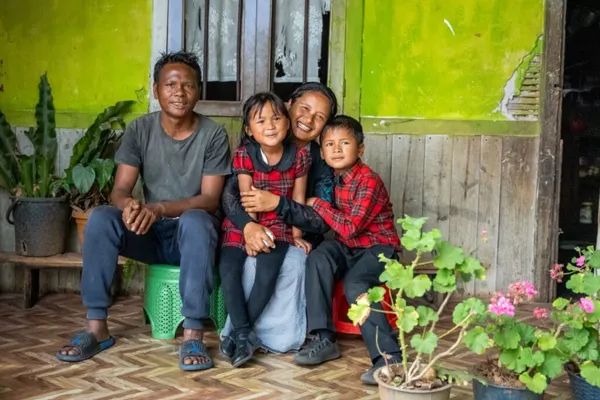Strong family environments: Safeguarding the future of children amid global challenges

Growing up in a nurturing and safe family environment is crucial for the optimal development of children and young people and for their rights to be upheld. When faced with vulnerabilities that may hinder the protection of their children, families must be supported with policies and programs that ensure their wellbeing and unity.
However, in today’s tumultuous world, millions of children face the risk of separation from their families. It is estimated that approximately 220 million children worldwide, or one in ten, have lost parental care or are at a heightened risk of losing parental care. On the African continent alone, a recent study estimates that 35 million children have lost parental care.
Moreover, the climate crisis, along with displacements caused by war and conflict across various regions, is resulting in the widespread breakdown of families and loss of care and protection for millions of children. From Sudan to Ukraine, Haiti to the Democratic Republic of Congo, from Israel/Palestine to the Sahel region of Africa and numerous other areas, families are being torn apart on a massive scale. An estimated 43.3 million children have been forcibly displaced from their homes, and 1.9 million children were born as refugees between 2018 and 2022. The absence or loss of a familial network severely limits their ability to confront and overcome these challenges during their formative years.
On this International Day of Families, it is imperative to consider the challenges that families face in appropriately caring for their children and taking action to avoid unnecessary separation. Securing basic needs, access to services, support when faced with unexpected shocks, and a decent income can significantly reduce the risk of family breakdown.
Children separated from their families face irreparable harm, impeding their chances of fulfilling their aspirations, overcoming challenges or becoming active members of their communities. Long-term detrimental effects may last into adulthood, such as increased risk of social, emotional and mental health difficulties.
Losing parental care imposes additional costs on governments and strains public services. With an increased number of neglected and abandoned children, societies can experience multifaceted and intergenerational long-term effects, including reduced productivity, increased burden on the juvenile justice system, mental health crises, and economic strain. Preserving and strengthening family environments is crucial for children and young people, and for ensuring the wellbeing of society, the economy and nations.
The 30th anniversary of the International Day of Families serves as a wake-up call for all stakeholders and duty-bearers to intensify efforts in safeguarding the rights and wellbeing of every child, especially those lacking family support or at risk of growing up without it.
Social protection policies and programs play a vital role in preventing unnecessary separation of children from their families. Governments and policymakers must prioritize child-focused social protection laws and frameworks that support families, thereby reducing the risk of family disintegration. Such initiatives enable families to develop coping mechanisms and resilience to overcome the challenges they face.
Establishing a well-financed and integrated child welfare and protection system is essential for identifying and supporting children and families early on, especially those living in the most vulnerable conditions. Offering comprehensive services such as education, healthcare, mental health and psychosocial support, parenting assistance, and direct support measures like cash transfers or universal child benefits is critical. Investing in these systems becomes even more urgent when families lose a caregiver or are fleeing conflict or natural disasters that disrupt their lives.
We must all do our part. The partnership of governments, civil society organizations, and individuals is a driver to create a world where every child grows up in a secure, nurturing family environment, ensuring their rights are safeguarded and their futures are filled with promise and opportunity. Let’s stand in solidarity to build strong families everywhere so that every child – even those living amid turmoil – can grow to become resilient members of society.
Written by Dereje Wordofa, President of SOS Children’s Villages International.
